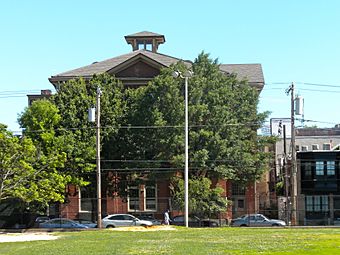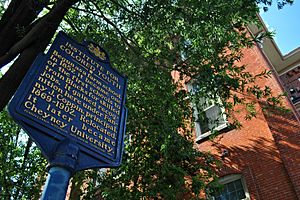Institute for Colored Youth facts for kids
|
Institute for Colored Youth
|
|
 |
|
| Location | 915 Bainbridge St., Philadelphia, Pennsylvania |
|---|---|
| Architect | Edward Fay |
| Architectural style | Italianate |
| MPS | Philadelphia Public Schools TR |
| NRHP reference No. | 86003324 |
Quick facts for kids Significant dates |
|
| Added to NRHP | December 4, 1986 |
The Institute for Colored Youth was an important school founded in 1837 in Philadelphia, Pennsylvania. It was created at a time when there were very few schools for African-American students. In fact, before the American Civil War, there was no organized higher education for black students in the United States. Laws in many places even stopped black people from getting an education.
This institute was the first higher education school for black students in the country. It later moved and changed its name to Cheyney University. Today, it is known as the oldest African-American school of higher education in the United States. The second location of the Institute for Colored Youth, at Ninth and Bainbridge Streets in Philadelphia, was added to the National Register of Historic Places in 1986. This building is also called the Samuel J. Randall School. It is a three-story brick building built in 1865 in the Italianate style.
Contents
How the Institute Began
The Institute was started by Richard Humphreys. He was a Quaker (a member of a Christian group) who cared deeply about others. Humphreys was born on a plantation in the Caribbean. He moved to Philadelphia in 1764. There, he saw how difficult it was for free African Americans to earn a living.
After hearing about a race riot in 1829, Humphreys decided to write his will. He left $10,000, which was a large sum of money back then, to help create a school. He wanted this school to teach people of African descent. His goal was to prepare them to become teachers and learn useful trades.
Early Years and New Focus
Using Humphreys' money, a group of thirteen Quakers formed an organization in 1837. For several years, they tried different ways to educate African-American children. They experimented with teaching farming, industrial skills, and trade apprenticeships.
By 1851, the Quakers, who were called "Managers," decided to change their focus. They chose to concentrate on Humphreys' original wish: training African-American students to become teachers. In 1852, they opened the first Institute for Colored Youth building at 716–718 Lombard Street in Philadelphia.
Learning and Teachers
The Quaker Board of Managers ran the Institute for Colored Youth. However, all the teachers were African-American men and women. The school had both a Boys' High School and a Girls' High School. It also had a Preparatory School for younger students.
The Institute offered a classical education to young African Americans in Philadelphia. This meant students learned advanced subjects. The curriculum included high-level mathematics, sciences, English, philosophy, social sciences, and classical languages like Latin or Greek.
A New Building for Growth
By 1861, the Managers realized their school needed a bigger and better place. The number of students was growing. They started a big fundraising effort to collect money.
After raising enough funds, they bought a piece of land at 915 Bainbridge Street. The new Institute for Colored Youth building officially opened on March 9, 1866. This new building was much larger. It could hold twice as many students as the first school. It also had new facilities, like a lecture hall and a chemistry laboratory.
Moving to Cheyney
In 1902, the Institute moved again. It relocated to George Cheyney's farm, which was about 25 miles (40 km) west of Philadelphia. After this move, the name "Cheyney" became connected with the school. Eventually, the school became known as Cheyney University.
Today, the old Institute for Colored Youth building at 915 Bainbridge Street is no longer a school. It has been turned into condos.
Notable Alumni
Many talented individuals attended the Institute for Colored Youth. Here are some of them:
 | Aurelia Browder |
 | Nannie Helen Burroughs |
 | Michelle Alexander |





